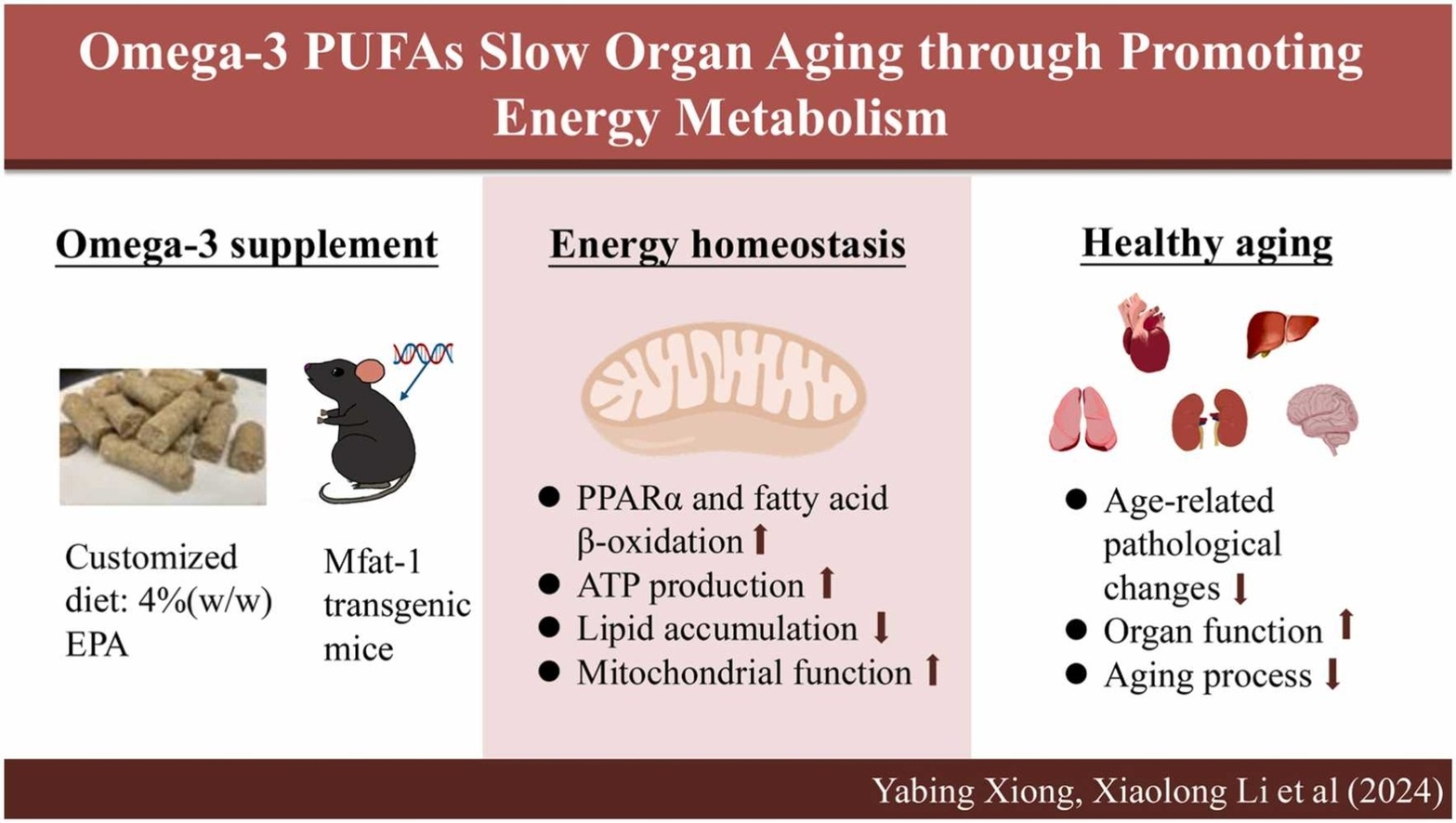
Omega-3 as an Anti-Aging Ally: Can These Fatty Acids Delay Aging?
A recent study published in the scientific journal *Pharmacological Research*, volume 208 of October 2024, available on ScienceDirect, explores how omega-3 fatty acids can act as anti-aging agents, reprogramming cellular energy metabolism and promoting lipid homeostasis. This finding, supported by rigorous laboratory tests, suggests that omega-3s can help slow down cellular aging and prolong the health of vital organs.
What Are Omega-3 Fatty Acids and Why Are They Essential?
Omega-3s are essential fatty acids, meaning our bodies cannot produce them on their own, and we must obtain them from external sources. The most studied types of omega-3s, EPA (eicosapentaenoic acid) and DHA (docosahexaenoic acid), are primarily found in fatty fish, such as salmon, sardines, and tuna. These fatty acids are known for their ability to reduce inflammation and improve cardiovascular and brain health.
How Do Omega-3s Affect Cellular Aging?
The study in question revealed that omega-3s not only help maintain cardiovascular health but also improve metabolic efficiency and reduce oxidative stress, which are two key factors in the process of cellular aging. This process helps cells maintain their integrity and functionality, which in turn can delay the aging of tissues and organs.
To understand the impact of omega-3s on cellular aging, researchers conducted tests on cellular models, analyzing how the fatty acids influence metabolism and oxidative stress. The results indicated that omega-3s help cells optimize energy use, partly due to their ability to improve mitochondrial activity. This is a key aspect of lipid homeostasis, or the balance of fats in the body, which helps maintain a healthy composition in cell membranes.

Lipid Homeostasis: The Balance of Lipids in the Body
Lipid homeostasis refers to the balance in the production, utilization, and elimination of lipids (fats) in the body. An imbalance in this system can lead to fat accumulation in undesirable places and metabolic problems that affect aging and overall health.
Omega-3s contribute to this balance by promoting a more efficient metabolism, helping the body regulate its lipid reserves and reduce fat accumulation that can cause issues such as chronic inflammation. Inflammation is directly related to premature aging, so by reducing it, omega-3s play a crucial role in maintaining cellular health.
Anti-Aging Benefits of Omega-3
The benefits of omega-3s for aging can be grouped into three main aspects:
- Reduction of oxidative stress: Omega-3s help neutralize free radicals, unstable molecules that damage cells and contribute to premature aging. By reducing cellular oxidation, omega-3s protect cells and prolong their lifespan.
- Improvement of energy efficiency: At the cellular level, omega-3s help mitochondria (the cell's "power plants") generate energy more efficiently. This reduces wear and tear and cellular inflammation, keeping cells in optimal condition for longer.
- Support for cardiovascular and cognitive health: Omega-3s not only promote longevity but also strengthen the heart and brain, two vital organs for a long and healthy life.
Evidence and Studies: What Does Science Say?
In the Pharmacological Research study, researchers from the University of Health Sciences of the Union in China conducted extensive trials to evaluate the effects of omega-3 on aging using cellular models. They analyzed different factors, such as the ability of cells to utilize energy, their resistance to oxidative stress, and the state of their lipid homeostasis. The tests showed that omega-3 consumption can act as a kind of “cellular reprogramming,” helping cells adapt and maintain their functions for longer.
Additionally, the researchers found that omega-3 improves mitochondrial activity, which is essential for cellular energy metabolism. By reducing oxidative stress and promoting greater energy efficiency, omega-3 helps reduce cellular wear and tear and ensures that cells retain their functionality over time. This combination of effects could slow the aging of organs and ultimately improve quality of life and prolong longevity.
Why Are Omega-3s Essential for a Healthy and Long Life?
Beyond anti-aging benefits, omega-3s play a role in maintaining healthy skin as their antioxidant and anti-inflammatory action helps delay the appearance of visible signs of aging, preserving cellular structure.
Which Omega-3 to Choose? The Importance of Quality
To get the maximum benefit, it is crucial to choose high-quality and pure omega-3 supplements. At Anastore, we offer pure Omega-3 formulated with selected ingredients to ensure product stability and its effectiveness in the body.
Key Benefits of Our Omega-3:
- Oil stability: Anastore's Omega-3 uses Qualitysilver®, a technology that provides five times greater stability due to its combination of antioxidants, which reduces the risk of oxidation.
- Sustainable fishing: Our omega-3 comes from sustainable sources and is certified by Friend of the Sea®, ensuring that its production does not harm the marine ecosystem.
- Optimal preservation: Opaque packaging helps protect the oil from light, ensuring its freshness and stability. To maintain its properties, it is recommended to store it in a cool place.
- Proper dosage: The 500 mg capsules are easy to ingest and are formulated to prevent overdosing. A daily dose of 1.5 g is recommended to obtain all the anti-aging benefits.
Conclusion
Omega-3 is not only a health ally, but it can also contribute positively to maintaining cellular vitality, energy efficiency, and the balance of fats in the body, helping to preserve cellular youth and improve long-term quality of life. This new study reaffirms its role as an essential nutrient for those seeking a longer and healthier life.

